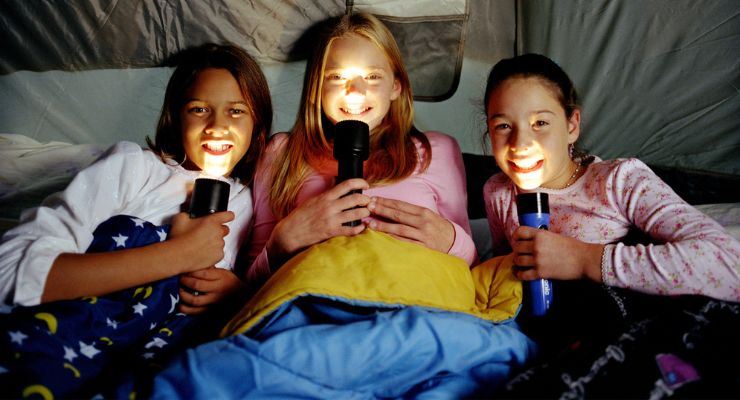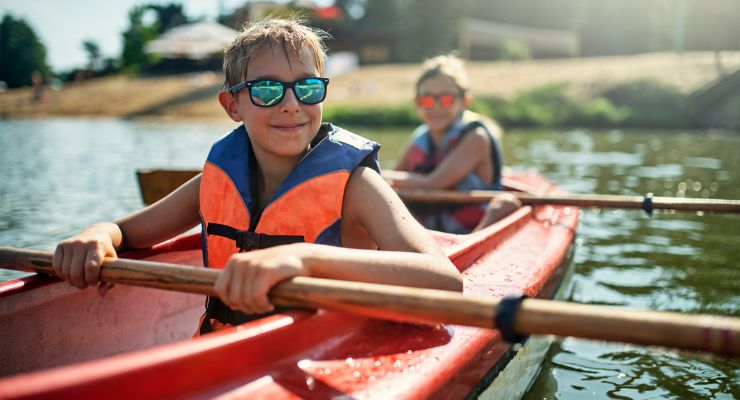Many parents turn to summer camps to keep their kids busy and engaged from June to August. For parents of younger children or those who haven’t sent a child to camp before, the idea of summer camp can be a little nerve-wracking. How can parents ensure summer camp safety for young children having their first summer camp experience?
Prisma Health’s Rahul Kataria, MD, is here to explain what parents need to know about summer camp safety and how to ensure they carry those amazing summer camp memories for a lifetime. Thank you to Prisma Health for sponsoring this article!
How to know if your child is ready for an overnight camp
Many summer camps are “day camps,” where children are dropped off in the morning and picked up at lunch or in the afternoon. Others offer overnight stays for days or sometimes up to multiple weeks. How can you know if your child is ready for an overnight camp?
“There is no specific age where every child is ready for overnight camping,” Dr. Kataria said. “Most overnight campers start at around 8 or 9 years of age. Some younger children may be eager to try it out, while some older children may just not be ready. Every child has different needs.”
Your child may be ready for overnight camp if:
- They can take care of their own hygiene needs without help.
- They have had successful sleepovers away from home.
- They have experience with babysitters who have helped them get to bed successfully.
- They understand what sleepaway camp means.
Are summer camps beneficial?
Time spent at camp can help students develop important social, emotional and cognitive skills. Different camps will have different options and activities, but all camps offer opportunities to make friends and grow as a person.
Benefits of sending your child to summer camp include:
- Promoting independence
- Teaching teamwork and resiliency
- Screen-free fun activities and time for play
- Connecting with nature
- Creating new social connections and nurturing friendships
- Supporting healthy living
- Teaching children to respect differences
- Developing new skills and confidence
“Each child is unique,” said Dr. Kataria. “That said, I believe summer camps really are beneficial for all children.”
What should parents know about summer camp for children who have medication, sensory or dietary needs?
“Talk to your camp’s director, first,” said Dr. Kataria. “Let them know about any special medication or healthcare needs. Children with conditions like food allergies or asthma will need a special emergency action plan.”
Research ahead of time to see if the camp allows tree nut or peanut products – and if they do, you may be able to request that they withdraw those items this year while your child is attending, or you can find other camps that don’t allow common allergens to be a part of the meal. For children who may need an inhaler, epinephrine auto-injectors like the EpiPen, or other emergency medications, make sure that your child knows how to use them before they arrive at camp.
Children often need assistance with these items, which is where your emergency action plan comes in. The camp director should ensure that camp counselors and staff know how to help your child in case of emergency.
Some camps specialize in activities and experiences aimed at children with autism or other sensory needs or have plans in place to ensure the child has a comfortable and positive experience. Never hesitate to reach out with questions or concerns about summer camp safety rules at the camp you’re interested in before you sign up.
What are some common summer camp safety hazards?
“Most of the risks and hazards associated with overnight camp are the same as those experienced at home,” said Dr. Kataria. “Insect bites or skin irritations (like poison ivy) might be the most common concern.”
Other summer camp hazards include:
- Drowning or swimming-related injuries—Children at camp may have varying levels of swimming ability and should be closely supervised whenever they are around water.
- Slip and fall injuries—Also called ‘playground injuries,’ these injuries are common when excited children run from location to location throughout the day.
- Heat stroke or sunburn—Campers often spend lots of time out in the sun, heat and humidity. It is essential that campers remain hydrated, and that sunscreen is regularly reapplied.
- Burns—Where there is summer camp, there is almost always a campfire. Fire safety needs to be taught by camp staff at every camp that makes use of open flames. No camper should be starting a fire without supervision, and every camp that uses fire should walk children through safe ways to light, maintain and cook with a campfire.
What can parents do to make sure their kids are safe at summer camp?
“There are several steps parents can take to make sure their kids are safe at overnight camp,” said Dr. Kataria. “The American Academy of Pediatrics recommends choosing camps accredited by the American Camp Association, to make sure the camp environment is safe and nurturing.”
Parents should also speak with their children about the activities they will be doing at the camp ahead of time. If there will be swimming or other water activities, swim lessons prior to the camp’s start date can help your child to be a stronger swimmer and lessen the chance of injury. Helmets should be worn if children ride horses or anything with wheels, and safety equipment should be worn while playing sports.
Talk to your child about the camp’s rules and policies ahead of time.
Talk to camp leadership about any special needs or specific accommodations your child will require while at camp and avoid making any significant changes in medication or routine before they arrive. Make sure you send all medications to camp with your child, and that there is enough to cover the entirety of the time they will be away. Emergency medications should be packed, and your child and the camp staff should know their emergency action plan, the location of any emergency medications and feel comfortable implementing the plan if needed.
“Speak with your child about safe boundaries,” said Dr. Kataria. “Every child should be educated about body safety and know that it’s okay to stick to their boundaries, and that they should feel safe speaking up if they are uncomfortable.”
Help your child to identify safe adults they can speak with if you are unable to be immediately reached.
What should parents do if their child is homesick while at camp?
The first time sleeping away from home can be scary for any child, so it is important to prepare your child ahead of time. You can talk to them about the exciting new experiences at the camp and be enthusiastic! Your optimism will help your child to feel more excited and optimistic as well.
If your child expresses fear ahead of time, or becomes homesick, acknowledge their feelings but encourage them to stay at camp if they are safe and comfortable but simply miss home.
“Try to be reassuring first and avoid the temptation to take your child home early due to homesickness,” said Dr. Kitaria. “Don’t try to offer some kind of material reward in exchange for staying – just offer your reassurance and understanding but encourage them to stay.”
One idea that might help curb homesickness is to have your child pack a couple of comfort items and maybe their own small blanket or something that smells like home. Some camps also allow children to regularly send emails or other messages to help them feel connected to home as well.
Feeling homesick while at summer camp is common, and camp staff often has ideas or plans in place that can help children to overcome their homesickness and have an amazing overnight summer camp experience.
Need a Primary Care Doctor?
The best time to schedule a new patient visit is while your child is well. Find a provider who’s right for your family by viewing online profiles, star ratings and reviews.
Rahul Kataria, MD is a pediatrician with Prisma Health Primary Care – Fountain Inn.









